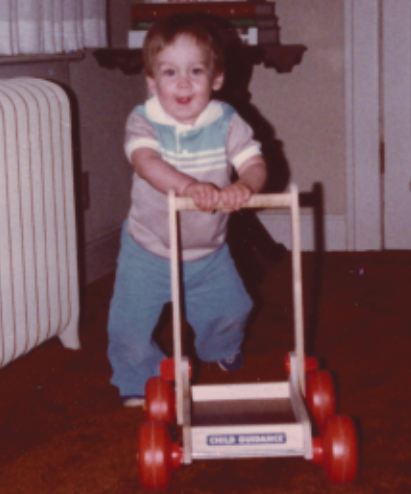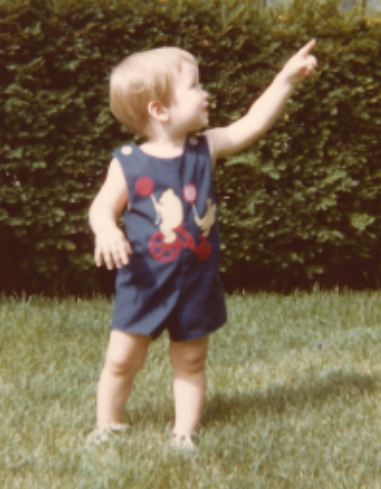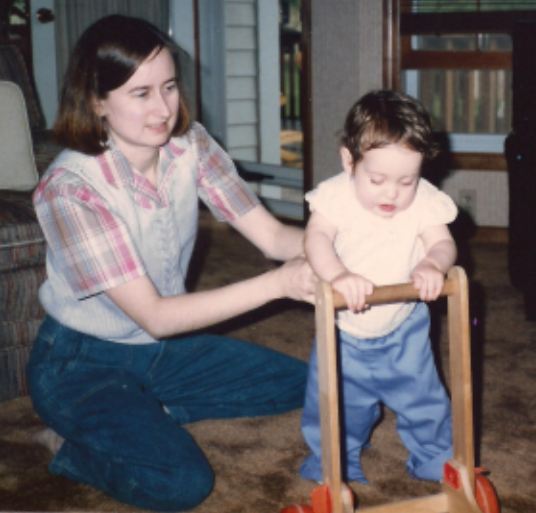I’ve been thinking a lot about walking recently, because of my daughter’s broken leg. Her accident and recuperation have brought to mind the days when she and her older brother learned to walk.
I learned a lot about my children watching them learn to walk. Neither of them walked until they were 14 or 15 months old, so I had plenty of time to observe their learning styles.
My son – my firstborn – didn’t attempt to walk until he did it by mistake. For months he employed a wall-hugging strategy. He kept a hand on some surface – a wall, a kitchen cabinet, a piece of furniture – and lunged from support to support without ever letting go with his hand. If he couldn’t lunge, he dropped to his hands and knees, crawled the two steps between supports, and pulled himself vertical again.

My husband and I weren’t worried about our son’s physical development, because many of the “supports” he used provided no real support at all. His favorite crutch was a little wagon he wheeled ahead of him, like a walker (which I suppose it was). It was too light to provide any stability, and it rolled. But it was enough to convince him he was safe. When he wanted to change directions, he swung the wagon in a new direction and headed off pushing his fictitious wall. We knew someday he would let go.
One Friday evening, my husband, son and I were on our sun porch playing with the dog. Our 15-month-old boy got so excited at the dog’s antics that he toddled across the room, giggling the whole time, not realizing he had left his crutch behind.

The poor dog also didn’t realize the magnitude of the moment. The mutt’s bewildered expression showed his surprise that this small human had suddenly launched toward him and grabbed handfuls of fur.
But my husband and I knew it was a milestone, and congratulated our son on his transition to toddlerhood.
And overnight our son did in fact become a toddler. His success at crossing the room that Friday evening was all the input he needed to give up crawling. By that Sunday, he raced down the center of hallways where just days before he hugged the walls, and tagged along behind my husband as they did yard work together.

By contrast, our daughter started practicing her walking when she was about nine months old. She pulled herself up on furniture, took a tentative step, fell, crawled back to the furniture, hauled herself up, and tried again. Over and over she tried. For weeks she tried, and the weeks became months.
She knew she was supposed to be upright, but couldn’t quite figure out how to make it work. Finally, at 14-and-a-half months she started walking. All that work, and it only gave her a two week advantage over her brother. I think she is still bitter.
Both children are now adults. All their lives, they have behaved the same way they did when they learned to walk. My daughter sets a goal, makes a plan, and works the plan until she reaches the goal.
My son tends to wait for the next step in life to come his way, which it usually does. Planning is not his strong suit, but somehow things fall in place for him.
 My daughter’s broken leg also caused me to remember another way in which my children’s personalities differ. She recently returned to the doctor, and was told her leg is healing as expected. She came away from the doctor’s appointment with an X-ray displaying the new hardware in her leg, and posted the picture on Facebook.
My daughter’s broken leg also caused me to remember another way in which my children’s personalities differ. She recently returned to the doctor, and was told her leg is healing as expected. She came away from the doctor’s appointment with an X-ray displaying the new hardware in her leg, and posted the picture on Facebook.
Her brother’s Facebook comment in response to the X-ray photo: “You have a weapon!”
Now why does this not surprise me?
I’d always thought that boys and girls were essentially the same until I had a child of each gender. I thought nurture was a bigger factor in how children behaved than nature.
Then I learned that boy children make weapons out of everything. My son did not have guns for toys when he was a pre-schooler, but by the time he was three, he had learned to bite his toast into the shape of a gun and start shooting.
“Bang! Bang!” he yelled in glee as he pointed his menacing peanut butter and jelly sandwich at me.
My daughter, though a tomboy and willing to wrestle a ball away from anyone, never made guns out of her food. And in response to his Facebook comment, she admonished her brother that her leg was not a weapon.
Walking and weapons were just two of the ways in which my children demonstrated their individuality. Watching them grow, I learned many lessons about diversity. And I’m still learning.
How did the siblings in your family differ?




A gun made of peanut butter, jelly and bread? Is he a creative guy now?
Dane,
He’s a government employee, doing social media work. Is that creative?
Theresa
I’ll keep an open mind to government employees being creative…if they’re related to you.
Really good post. Thanks for sharing.
Thank you!
[…] create the pictures for Monday’s post about my children learning to walk, I had to find the box of old snapshots at the top of the linen closet, drag it down (it’s […]
My sister and I differ a great deal. The only thing we have in common are parents, relatives and a short period of about eight years when we lived in the same household before she left for college and never came home. That ten-year difference meant we had little in common once she left the house.
I was the older sister in our family. My brother started kindergarten the year I left for college, so it often felt like we had little in common. Now that we’re in our middle years, the age difference doesn’t feel as huge.
Thanks for commenting.
Theresa